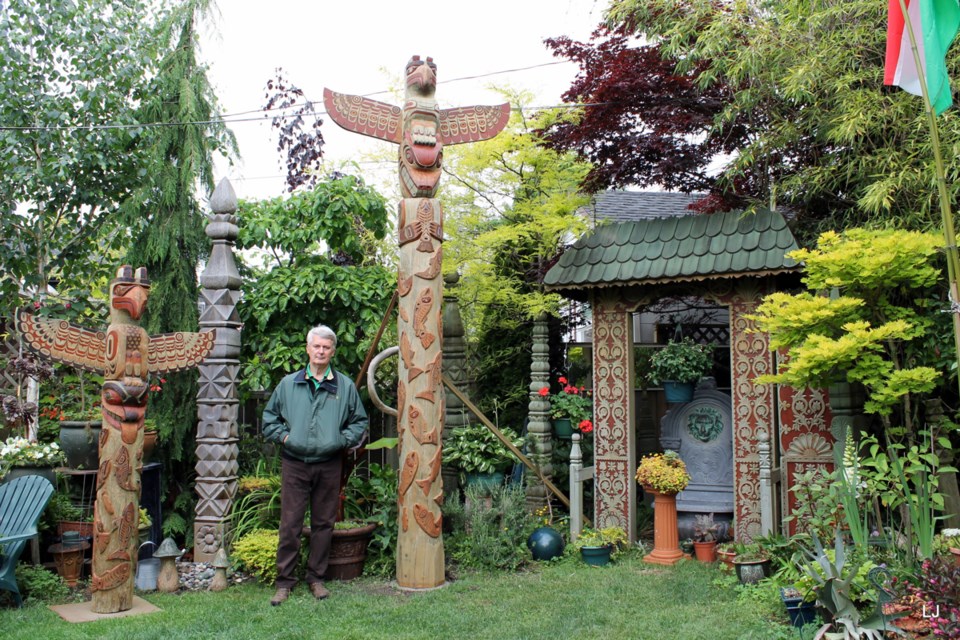Editor’s note: John Kurucz is Les Jozsa’s nephew
The house you live in, the guitar you strum, or even the couch you hang your hat on — chances are, Les Jozsa likely left his imprint and expertise on it.
A renowned forestry scientist, carver and UBC alumnus, Jozsa died Oct. 5 after a brief battle with cancer. He was 78.
His colleagues, family and mentors remember the Vancouver resident as a man of immeasurable talents. He authored more than 150 academic papers that would go on to help shape forestry practices across the world. He lectured in North America, Europe and South America, helping industry and governments ensure maximum quality and quantity in secondary wood products: furniture, doors, windows, veneer products, skateboards, musical instruments, log homes and more.
“He is a Renaissance man because he could do all kinds of things and do them very well: he was an athlete, an academic, he cooked superbly, he was a gardener, an artist, he could speak in public well,” said Bob Kennedy, a former dean of the UBC faculty of forestry. “I don’t know of anybody else who had that variety of skills.”
Jozsa was born outside of Budapest, Hungary in 1938. He and close to 500 other forestry students and professors from the Sopron Forestry School fled the country in 1956 during the Hungarian Revolution. Of that group, more than 200 travelled to Canada and continued their studies at UBC beginning in September 1957.
Jozsa’s work as a research scientist for UBC began in the early 1970s, and the majority of his career was spent at FPInnovations, a forestry research company with offices in Vancouver, Alberta and Quebec.
After his retirement in 2000, Jozsa was retained by FPInnovations, formerly known as Forintek, as a research scientist emeritus. In that capacity, he whittled down expansive, technical knowledge for thousands of students, engineers, architects, and forestry and building executives at lectures on three continents.
“As far as I’m concerned, and as far as everybody else is concerned, he was the foremost expert on wood sciences in English-speaking Canada,” said Dalibor Houdek, Jozsa’s former co-worker at FPInnovations. “Whenever someone had a question they would go to Les. He had an incredible gift of explaining wood science. He could sit a grandmother down, and in an hour she would understand and retain that information.”
Jozsa’s artistic pursuits rivalled his breadth of scientific knowledge, and he specialized in Hungarian and other eastern European carving methods. In 1992, he gifted a massive welcoming gate carved from yellow cedar to the UBC faculty of forestry that remains on the school grounds to this day.
It serves as a symbol to commemorate the mass Hungarian student migration to UBC and a gesture of thanks to the new country that adopted them.
“He was an amazing person, whose love of wood and expertise in turning it into wonderful objects, like our seminal Sopron Gate, captures just some of the live-life-to-the-fullest that was Les,” said former forestry faculty dean Jack Saddler.
His most recent carving of note followed in a similar gesture of thanks. In 2011, Jozsa carved a four-metre totem that featured salmon swimming up towards the top of the piece. He incorporated First Nations artistic traditions on the totem and its message mirrors that of the life cycle of salmon: their journey upwards is an allegory for the life Jozsa and his forestry classmates led.
Later that year, the totem was gifted to his former university in Hungary to mark the 50th anniversary of the UBC grads.
“He was a proud Hungarian, but even prouder Canadian,” his son David told the Courier. “He was very appreciative of the opportunities Canada provided for him and his family.”
@JohnKurucz



